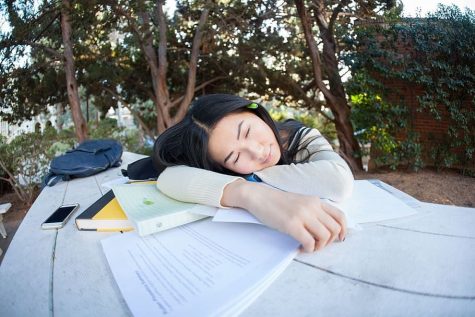Should School Start Later?
RING RING RING – the sound of your alarm singing its bitter calling. Your eyes flutter open and a wave of tiredness tries to drag you back to slumber. This is the description of waking up for school. It’s typically not pretty. Waking up extremely early can affect a students’ performance in school and overall mental health. Believe it or not sleep is a huge part of mental health and can affect it easily. So, for our mental health, should school start later?
Experts say teenagers are biologically wired to stay up later than younger kids and getting up for school earlier certainly doesn’t help. The American Academy of pediatrics states that teenagers insufficient sleep a public health issue. They recommend that middle and high school students start no later than 8:30 am.
Recently, California was the first state to mandate delayed school start times. “There are resulting improvements across the board: grades improve, attendance goes up and graduation rates go up fairly significantly,” says Lisa L. Lewis, a parenting journalist and the author of “The Sleep-Deprived Teen: Why Our Teenagers Are So Tired, And How Parents And Schools Can Help Them Thrive.” “Studies have shown over and over that teens get more sleep when school starts later, with research-based benefits to their physical and mental health, academic performance and beyond,” says Elinore Boeke, communications director for Start School Later, a nonprofit organization that lobbied for California’s new law. Overall, California’s new law has helped tremendously with students performance and health.
 The first of many benefits of starting school later is better mental and physical health. Teenagers need eight to ten hours of sleep each night, but about 60% of middle school students and 70% of high school students don’t get enough sleep on school nights, according to the CDC. In adolescence, changes to the body’s “sleep drive” and a delayed release of the sleep hormone, melatonin makes it more difficult to fall asleep earlier. “Research shows that when school starts later, teens get more sleep”, says Shelby Harris, a sleep psychologist and clinical associate professor at the Albert Einstein College of Medicine, with “many adolescents able to obtain at least eight hours of sleep per night.” That leads to better physical and mental health, including decreased rates of depression and anxiety and less caffeine use”. Harris says. Adolescents who got eight hours of sleep reported they had good overall health and were less likely to use substances like caffeine to stay awake, from a study at the Center for Applied Research and Educational Improvement at the University of Minnesota. “Kids are more likely to eat breakfast, and teachers find kids smiling and awake to learn in first period,” Boeke says.
The first of many benefits of starting school later is better mental and physical health. Teenagers need eight to ten hours of sleep each night, but about 60% of middle school students and 70% of high school students don’t get enough sleep on school nights, according to the CDC. In adolescence, changes to the body’s “sleep drive” and a delayed release of the sleep hormone, melatonin makes it more difficult to fall asleep earlier. “Research shows that when school starts later, teens get more sleep”, says Shelby Harris, a sleep psychologist and clinical associate professor at the Albert Einstein College of Medicine, with “many adolescents able to obtain at least eight hours of sleep per night.” That leads to better physical and mental health, including decreased rates of depression and anxiety and less caffeine use”. Harris says. Adolescents who got eight hours of sleep reported they had good overall health and were less likely to use substances like caffeine to stay awake, from a study at the Center for Applied Research and Educational Improvement at the University of Minnesota. “Kids are more likely to eat breakfast, and teachers find kids smiling and awake to learn in first period,” Boeke says.
Another reason school should start later is the improvement in academic performance. For instance, one study by the National Sleep Foundation found that both attendance and graduation rates “significantly improved” in schools that delayed their start times to 8:30 a.m. or later. Studying middle schools in Wake County, North Carolina, with variable start times, economics professor Finley Edwards found that starting school an hour later would raise test scores an average of 2 percentile points in math and 1.5 points in English. Effects were larger for lower-performing students. Using Edwards’ methodology, but on a national scale, the authors of another study estimated that National Assessment of Educational Progress math scores for eighth graders would increase as much as 8 points if schools started one hour later, which is what researchers say is a full grade level increase. Jessica Baltaxe, an 11th grader at Angelo Rodriguez High School in Fairfield, California, is starting school a half-hour later this year, and says her and her fellow classmates like being able to sleep in. “A half-hour doesn’t seem like a lot of time, but it makes a big difference,” she says. “Many students go to bed late because of the demands of their coursework and extracurriculars, so by providing extra time in the morning it sets them up to have a more productive day.”
The third reason school should start later is the reduced risk of car accidents and injuries. Multiple studies have shown that both overall car crash and distracted driving crash rates drop tremendously with delayed school start times, which can reduce mortality and morbidity in adolescents. Research on delayed school start times also show that there are fewer sports-related injuries, Harris says. Several studies show the importance of adequate sleep for student athletes. “Getting a good night’s sleep and getting it at the right time has been shown to improve student athletes’ accuracy and reaction time and significantly lessen their risk of injury,” Boeke says.
The final reason of why school should start later is fewer tardies. Regular tardiness is a common issue for sleep deprived teens. But starting school later can certainly make it less common since students are more awake and ready for school. “Repeated studies show that starting secondary schools at 8:30 a.m. or later significantly boosts on-time attendance,” says Joy Wake, advocacy director for Start School Later. She notes this is especially so for financially disadvantaged or lower-performing students who already face obstacles in getting enough sleep and getting to school on time. “Being well-rested boosts emotional resiliency,” Lewis says. “When teens get more sleep, they’re better equipped emotionally to deal with all of the daily stressors.” While tardiness may not have been an issue for Baltaxe, she says the later start times make a big difference for busy students like herself. “Before, I was still waking up during class, but now I feel more prepared to take on the day,” Baltaxe says. Overall, the tardiness levels went down significantly.
Even with all these reasons to go to school later, there are still benefits to waking up at the time we do now or earlier. It can give more time for students to do homework, sports, work, family time and more. Some also believe that changing the schedule could mess up students routine and cause more stress.
All in all, sleep is a principal to life and is extremely important to thrive. Teens especially need eight to ten hours of sleep to do well in school and daily life. Students will ultimately have better overall health, better grades, less car accidents and sport injuries, and reduced tardiness. Delaying schools starting time will help students succeed and improve mental and general health.





